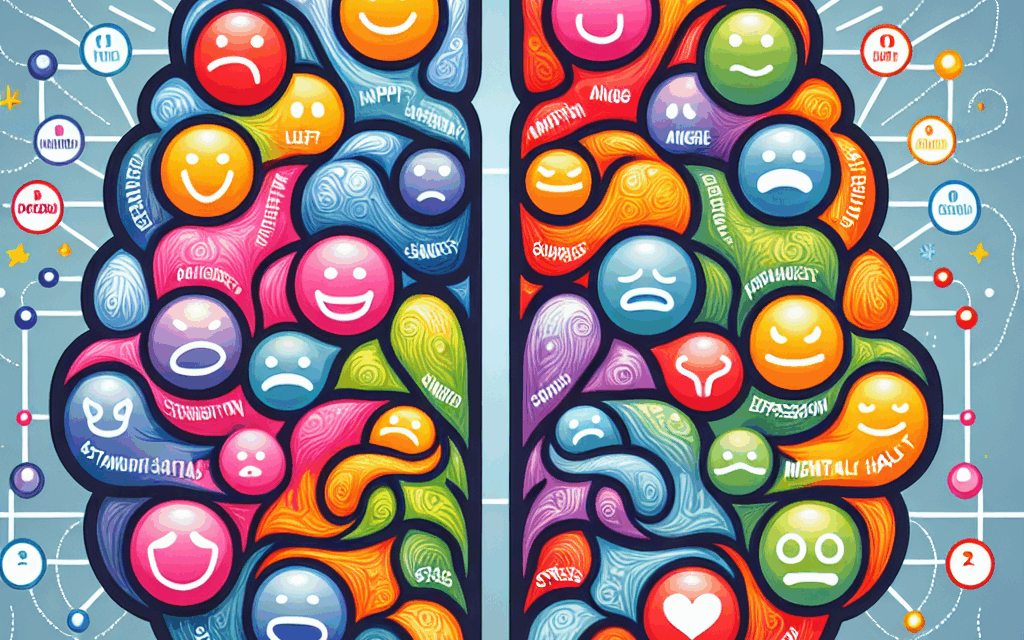Does Your Personality Influence Your Mental Health?
The intricate relationship between personality and mental health has been a subject of interest for psychologists, researchers, and the general public alike. Understanding how personality traits can influence mental health outcomes is crucial for developing effective interventions and promoting overall well-being. This article delves into the multifaceted connection between personality and mental health, exploring various dimensions of this relationship through five key subtopics.
1. Understanding Personality: The Big Five Model
To comprehend how personality influences mental health, it is essential to first understand what personality is. Personality refers to the individual differences in characteristic patterns of thinking, feeling, and behaving. One of the most widely accepted frameworks for understanding personality is the Big Five model, which includes five broad dimensions:
- Openness to Experience: This trait features characteristics such as imagination, curiosity, and a willingness to engage in novel experiences.
- Conscientiousness: Individuals high in conscientiousness are organized, dependable, and disciplined.
- Extraversion: This trait encompasses sociability, assertiveness, and a tendency to seek stimulation in the company of others.
- Agreeableness: Agreeable individuals are compassionate, cooperative, and eager to avoid conflict.
- Neuroticism: This dimension reflects emotional instability, anxiety, and moodiness.
Research has shown that these traits can significantly influence mental health outcomes. For instance, individuals high in neuroticism are more prone to anxiety and depression, while those high in conscientiousness tend to exhibit better mental health and resilience.
Studies have demonstrated that personality traits can predict mental health disorders. For example, a meta-analysis published in the journal Psychological Bulletin found that neuroticism is a robust predictor of various mental health issues, including anxiety disorders and depression. Conversely, traits like conscientiousness and agreeableness are often associated with lower levels of psychological distress.
2. The Role of Neuroticism in Mental Health
Neuroticism, characterized by emotional instability and a tendency to experience negative emotions, plays a pivotal role in mental health. Individuals high in neuroticism are more likely to experience stress, anxiety, and depressive symptoms. This section explores how neuroticism affects mental health and the mechanisms behind this relationship.
Research indicates that neuroticism can lead to a heightened perception of stressors and a lower threshold for emotional distress. For example, a study published in the journal Personality and Individual Differences found that individuals with high neuroticism reported more frequent and intense experiences of negative emotions, which can exacerbate mental health issues.
Moreover, neuroticism can influence coping strategies. Individuals high in this trait may resort to maladaptive coping mechanisms, such as avoidance or rumination, which can further perpetuate feelings of anxiety and depression. In contrast, those with lower levels of neuroticism are more likely to employ adaptive coping strategies, such as problem-solving and seeking social support.
Case studies illustrate the impact of neuroticism on mental health. For instance, a longitudinal study involving college students found that those with higher neuroticism scores were more likely to develop anxiety disorders over time. This highlights the importance of addressing neuroticism in therapeutic settings, as interventions aimed at reducing neurotic traits may lead to improved mental health outcomes.
3. The Protective Effects of Conscientiousness
Conscientiousness is often viewed as a protective factor against mental health issues. Individuals who score high in conscientiousness tend to be organized, responsible, and goal-oriented, which can contribute to better mental health outcomes. This section examines how conscientiousness influences mental health and the underlying mechanisms involved.
Research has consistently shown that higher levels of conscientiousness are associated with lower rates of depression and anxiety. A study published in the journal Health Psychology found that individuals with high conscientiousness were less likely to experience depressive symptoms, even in the face of stressful life events. This resilience can be attributed to several factors:
- Goal Setting: Conscientious individuals are more likely to set and pursue achievable goals, which can foster a sense of purpose and accomplishment.
- Healthy Lifestyle Choices: Those high in conscientiousness often engage in healthier behaviors, such as regular exercise and balanced nutrition, which positively impact mental health.
- Effective Coping Strategies: Conscientious individuals tend to employ adaptive coping strategies, such as planning and problem-solving, which can mitigate the effects of stress.
Case studies further illustrate the protective effects of conscientiousness. For example, a longitudinal study involving older adults found that those with higher conscientiousness scores reported better mental health and lower levels of cognitive decline. This suggests that fostering conscientious traits may be beneficial for maintaining mental health across the lifespan.
4. Extraversion and Social Support: A Double-Edged Sword
Extraversion is characterized by sociability, assertiveness, and a tendency to seek out social interactions. While extraversion is often associated with positive mental health outcomes, the relationship is complex and can vary based on context. This section explores how extraversion influences mental health and the role of social support.
Research indicates that extraverted individuals tend to have larger social networks and are more likely to seek social support during times of stress. A study published in the journal Journal of Personality found that extraversion was positively correlated with perceived social support, which is a crucial factor in mitigating mental health issues.
However, the relationship between extraversion and mental health is not entirely straightforward. For instance, extraverted individuals may experience pressure to maintain their social image, leading to anxiety and stress. Additionally, if their social interactions are superficial or lack depth, they may not derive the emotional support needed during challenging times.
Case studies highlight the dual nature of extraversion. For example, a study involving young adults found that while extraversion was associated with lower levels of depression, those who relied heavily on social validation experienced increased anxiety. This underscores the importance of fostering meaningful connections rather than merely increasing social interactions.
5. The Impact of Personality on Treatment Outcomes
Understanding the influence of personality on mental health is not only important for diagnosis but also for treatment. This section examines how personality traits can affect treatment outcomes and the implications for therapeutic approaches.
Research has shown that personality traits can influence the effectiveness of various therapeutic interventions. For instance, individuals high in neuroticism may benefit from therapies that focus on emotional regulation and coping strategies. Cognitive-behavioral therapy (CBT) has been found to be particularly effective for those with high neuroticism, as it helps individuals challenge negative thought patterns and develop healthier coping mechanisms.
Conversely, individuals high in conscientiousness may respond well to structured therapeutic approaches that emphasize goal setting and accountability. A study published in the journal Clinical Psychology Review found that conscientious individuals were more likely to adhere to treatment plans and engage in self-care practices, leading to better mental health outcomes.
Moreover, personality assessments can inform treatment planning. For example, therapists can tailor interventions based on an individual’s personality profile, enhancing the likelihood of successful outcomes. This personalized approach can lead to more effective treatment strategies and improved patient satisfaction.
Conclusion
The relationship between personality and mental health is complex and multifaceted. Understanding how personality traits influence mental health outcomes can provide valuable insights for individuals seeking to improve their well-being and for professionals working in mental health care. Key takeaways from this exploration include:
- Personality traits, particularly neuroticism and conscientiousness, play a significant role in predicting mental health outcomes.
- Neuroticism is associated with increased vulnerability to anxiety and depression, while conscientiousness serves as a protective factor.
- Extraversion can enhance social support but may also lead to stress if social interactions are superficial.
- Personality traits can influence treatment outcomes, highlighting the importance of personalized therapeutic approaches.
- Understanding one’s personality can empower individuals to adopt strategies that promote mental well-being.
In conclusion, recognizing the interplay between personality and mental health is essential for fostering resilience and promoting psychological well-being. By addressing personality traits in therapeutic settings and encouraging individuals to cultivate positive traits, we can pave the way for improved mental health outcomes and a more fulfilling life.





